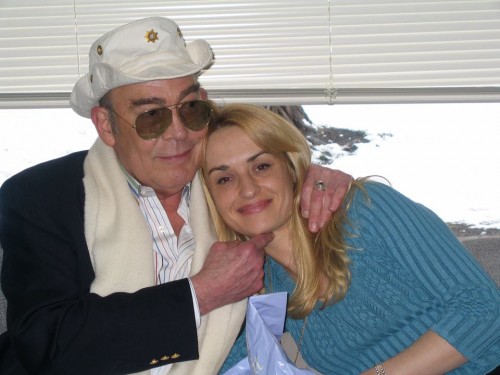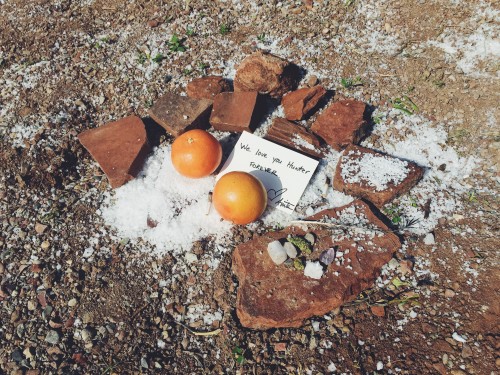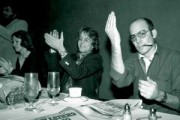WOODY CREEK, COLO. — On what was the first bluebird Saturday afternoon in weeks, Hunter S. Thompson’s infamous Woody Creek home was the ne plus ultra of settings to celebrate the start of summer and the culmination of NORML’s Legal Seminar in Aspen.
The National Organization for the Reform of Marijuana Laws’ annual meeting in the mountains, running May 28-30 this year, brought close to 100 attorneys together at The Gant for a three-day symposium schedule led by an impressive roster of guest speakers. But the highlight for event registrants and a small list of lucky locals is always the symposium’s finale: A cookout at Owl Farm as the guest of Thompson’s widow, Anita Thompson — a NORML tradition that started in 2007.
And this year’s gathering was even more momentous: 2015 marks the 45th anniversary of NORML’s inception and the 10th of Hunter S. Thompson’s death. It was here where the literary legend and counterculture icon lived from 1969 to 2005, when he took his own life at the self-described “fortified compound.”
More Cannabist long reads
Praying for Texas marijuana: Boots on the ground in pot’s biggest battlefield
The Neal Pollack pilgrimage: On ganja yoga, pot pretzels and a greater understanding
Wine & Weed: A guide to flavor, pot pairings, wine profiles
Watch The Cannabist Show. Follow The Cannabist on Twitter and Facebook
Tucked up on a ridge in Woody Creek Canyon about 10 miles from Aspen among sweeping mountain vistas, cars lined the makeshift parking lot in tall grass marked with gunshot-dotted barrels Thompson used for target practice. Guests made their way toward the main log cabin, welcomed by a sign with one of the writer’s many classic quotes:
“It never got weird enough for me ….”
Keith Stroup founded NORML in 1970, and it has since grown into one of the largest non-profit organizations committed to legalization policy. With longtime, big-name board members including Willie Nelson, Woody Harrelson and Bill Maher, NORML counts Hunter S. Thompson as its original public supporter. Now serving as the organization’s legal counsel, Stroup is the esteemed leader among the first generation of marijuana lawyers.
“For a lot of us, we’re getting long in the tooth — and now, so many new people are coming from out of state to learn what’s happening here. They’re blown away. Colorado is the promised land,” says Stroup. “For a lot of people in my generation — this is hallowed ground. It really is.”
The sacred soil he’s referring to is of course in honor of his “great, great friend,” who he met in 1972 at the Democratic National Convention in Miami. Stroup was genuinely joyous as he made his way from mingling to the microphone for a short speech.

Anita Thompson followed with, “I’m so honored to have you all here, to be with Hunter — on his land — his beloved earth that you’re standing on. His spirit is in it. And I know that he would want me to welcome you and thank you so much for supporting this cause — for the last four and a half decades.”
She reminded us that her late husband’s memorial was “almost exactly 10 years ago, when his ashes were shot out of a 150-foot canon,” encouraging everyone to walk up to “The Labyrinth” where the ceremony took place. “It’s not a maze. It’s a set path. And you can bliss out with Hunter there.”
It is only after a short, yet steep hike behind the house and up a few rock steps that the monument is visible, which on this day was marked with two grapefruits (a healthier staple in Hunter’s diet) and a handwritten note: “We love you Hunter FOREVER. ❤️ Anita.” Two partygoers added a half-smoked joint and two buds to the sweet shrine after smoking in silence on the owl-engraved wood bench.
Back down at the main house, live music from Bill and Jacki McGreevy filled the air as joints and pipes were passed among friends at picnic tables, on blankets and around the front porch. A framed photo of a shotgun-toting Hunter, a sign reading “Nobody Gets In To See The Wizard, Not Nobody, Not Nohow,” a 1981 Bob Dylan concert poster and a bright yellow Gonzo fist flag grace the exterior. There’s also a pen for his prized peacocks attached to the house, where Jesse was proudly basking in the sun. Stationed at the front screen door stood a security guard giving guests the O.K. to come in and have a look. Anita’s handmade party programs lined the entry table with a small, framed portrait of Hunter and a guest book required to sign for all who enter.
The front door opens directly into the living room, which immediately took this writer’s breath away. The room, completely untouched since Hunter left it, is filled with his work, life and spirit. His presence is apparent. On one of the many stuffed bookshelves sits a posthumous “Special 2006 Award” plaque from NORML for his “more than three decades of service to its advisory board and lifelong public advocacy for decriminalizing drug users.”

The Paris Review reported from Owl Farm in 2000, “(it) operates like an eighteenth-century salon, where people from all walks of life congregate in the wee hours for free exchanges about everything from theoretical physics to local water rights, depending on who’s there.”
Who was there? Everyone from celebrities and artists to journalists and politicians. His neighbors in Woody Creek, though, were among his closest friends — one of whom was Bob Braudis, the Pitkin County Sheriff from 1986 to 2011 and co-author of “The Kitchen Readings: Untold Stories of Hunter S. Thompson” in 2008.
Its storied kitchen counter, the epicenter of such a scene and where Hunter ingested much of his notorious daily routine, was where I sat down with Anita — and her beloved 14-year-old Siamese cat Caesar, who she said was “Hunter’s boy” — to talk about the lawyer-centric occasion.
“Some of our best friends were lawyers. Hunter loved his lawyers. They helped him live his lifestyle. They’re the ones on the front lines of the criminal justice system helping to fight for legalization and keep responsible smokers out of prison,” she says. “It’s astonishing to see after all these years that NORML’s work has worked.”
What began as a casual dinner invitation to a few of those friends in town for the conference nine years ago has grown into a tradition, one that Hunter would have loved, Anita said, although he was historically skeptical when it came to legalization.
“He didn’t really want it to be legalized, because he didn’t want the government to tamper with his beloved marijuana — he thought that the quality would go down and become like cigarettes, and it would become less pure,” she says. “It’s obviously not the case. With everyone I talk to, I know we have stronger and better marijuana than ever. I know he would be thrilled.”

NORML’s Stroup agrees: “He would have loved the progress … there’s no doubt about it. But I know what he would have said about the current system in Colorado, ‘There are too many regulations.’ He always thought he should be in control — if he wanted to give it away, buy it, grow it, eat it, snort it, shoot it — he should have that right.
“But if he were alive, he would on one hand be appreciative and proud of Colorado, but he’d also be very critical of what he would see as over-regulation.”
Anita, who “would smoke once in awhile with Hunter,” isn’t a regular smoker herself. But she can’t help but think of him when she visits a cannabis shop.
“He would have had a heyday! Could you imagine Hunter Thompson in a dispensary? Sometimes it breaks my heart when I go into one and that he’s not here. The best way to honor Hunter’s work is to have him in our hearts when we go into dispensaries, when we smoke legally and when we read his words.”
For chef Randy Placeres of Aspen Culinary Solutions, who has just recently started to expand into marijuana-infused menus, his first visit to Owl Farm was a “mind-blowing” moment.

“I met Anita today, and her passion about Hunter is beautiful. It shows that she just wants to share his life with all of us,” Placeres says.
NORML’s work continues every day out of their headquarters in Washington D.C. with 155 chapters in the United States and eight active international chapters.
“Colorado has taken what was essentially a legal theory and proved it. Now we have data, and it shows almost no unintended consequences,” Stroup says. “I knew we would one day win the battle, but there’s still a long road ahead.”
Colorado NORML Board Member Chris Chiari, who also ran for Denver City Council’s 10th District in last month’s election, has seen a significant shift in the year since he first attended the seminar in 2014.
“What I love is how specific the law is becoming — you have business professionals and business lawyers here, you have criminal lawyers doing drug defense here. All of these specialties are now relevant to marijuana and the legalization conversation,” Chiari says, while puffing on a pre-roll. “So many parts of the information coming out of here speak to what is going to get talked about in policy conversations in other states.”
Stroup says data shows only 14 percent of the American public smokes marijuana — and 86 percent does not.
“So we can’t win this issue by only appealing to stoners … there aren’t enough of us. The reason we’re winning is that we’ve largely won the hearts and minds of the majority of non-smokers. They’re not pro-pot, but they’re anti-prohibition. There’s no legitimate argument against it.
“I wasn’t sure if I would live long enough to see it, so I feel incredibly lucky to have done that. I get up every morning just delighted to be alive to witness all of these new cultural changes taking place.”
But Stroup, who didn’t start smoking until he was a first-year at Georgetown Law School, says that marijuana culture has always existed.
“I always felt very much a part of it — there was a great deal of appeal and community that we all felt — but to see it come above ground and be totally legitimized is just absolutely fascinating, rewarding and reinforcing. It basically says to all of us, ‘You’ve been right all along.’ ”
After reflecting on his 45-year journey, he headed off into the crowd “to go burn one” among his people — the only way to end this far-from-normal backyard barbecue.
